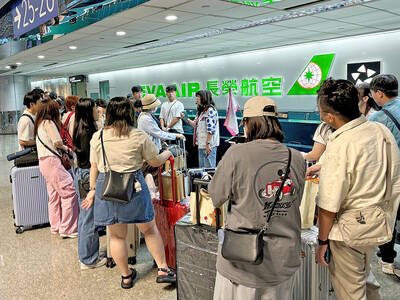Microbiologists at two universities in Kaohsiung City have discovered a bacteria capable of breaking down the poisonous substance dioxin efficiently and are trying to apply the species to a mass purging process to save on the time and cost involved in removing the pollutant, academic sources said.
National Sun Yat-sen University (NSYSU) and Cheng Shiu University (CSU) started the project with the aim of remedying the aftermath of dioxin pollution incidents, which at present cost millions of dollars to clean up and require the replacement of contaminated soil with clean soil.
Under the present method of treatment "the polluted soil still presents a health threat to humans and animals as there is no effective way of decomposing the substance," said Chang Chien Guo-pin (張簡國平), director of the CSU's Super Micro Mass Research and Technology Center.
Dioxin, a general term for a group of hundreds of highly persistent chemicals, is a by-product emitted in the production of herbicides, disinfectants and other agents. Dioxin has been proven to cause cancer and other diseases in humans.
The project was first initiated when a CSU team found that hundreds of bacterium species can survive and prosper in dioxin-laced soil, indicating that some of them must have the ability to "digest" and live off the chemical.
Later, Chang Chien said, they decided to cooperate with microbiologists from NSYSU to differentiate the various species -- among the several candidate bacteria, only one can break down the chemical with great efficiency, while the others work too slowly to attain economies of scale.
The bacterium -- which Chang Chien declined to identify as the patent application for the cultivation and purging process is still undergoing review -- is under intense scrutiny by the researchers to determine if it can also work at the same efficacy and efficiency outside the laboratory.
"Once the method proves workable, it will save billions of dollars that would otherwise have to be spent on removing polluted soil," Chang Chien said.

An alleged US government plan to encourage Taiwan Semiconductor Manufacturing Co (TSMC) to form a joint venture with Intel to boost US chipmaking would place the Taiwanese foundry giant in a more disadvantageous position than proposed tariffs on imported chips, a semiconductor expert said yesterday. If TSMC forms a joint venture with its US rival, it faces the risk of technology outflow, said Liu Pei-chen (劉佩真), a researcher at the Taiwan Industry Economics Database of the Taiwan Institute of Economic Research. A report by international financial services firm Baird said that Asia semiconductor supply chain talks suggest that the US government would

Starlux Airlines on Tuesday announced it is to launch new direct flights from Taiwan Taoyuan International Airport to Ontario, California, on June 2. The carrier said it plans to deploy the new-generation Airbus A350 on the Taipei-Ontario route. The Airbus A350 features a total of 306 seats, including four in first class, 26 in business class, 36 in premium economy and 240 in economy. According to Starlux’s initial schedule, four flights would run between Taoyuan and Ontario per week: Monday, Wednesday, Friday and Saturday. Flights are to depart from Taoyuan at 8:05pm and arrive in California at 5:05pm (local time), while return flights

WANG RELEASED: A police investigation showed that an organized crime group allegedly taught their clients how to pretend to be sick during medical exams Actor Darren Wang (王大陸) and 11 others were released on bail yesterday, after being questioned for allegedly dodging compulsory military service or forging documents to help others avoid serving. Wang, 33, was catapulted into stardom for his role in the coming-of-age film Our Times (我的少女時代). Lately, he has been focusing on developing his entertainment career in China. The New Taipei District Prosecutors’ Office last month began investigating an organized crime group that is allegedly helping men dodge compulsory military service using falsified documents. Police in New Taipei City Yonghe Precinct at the end of last month arrested the main suspect,

Nearly 800 Indian tourists are to arrive this week on an incentive tour organized by Indian company Asian Painted Ltd, making it the largest tour group from the South Asian nation to visit since the COVID-19 pandemic. The travelers are scheduled to arrive in six batches from Sunday to Feb. 25 for five-day tours, the Tourism Administration said yesterday. The tour would take the travelers, most of whom are visiting Taiwan for the first time, to several tourist sites in Taipei and Yilan County, including tea houses in Taipei’s Maokong (貓空), Dadaocheng (大稻埕) and Ximending (西門町) areas. They would also visit